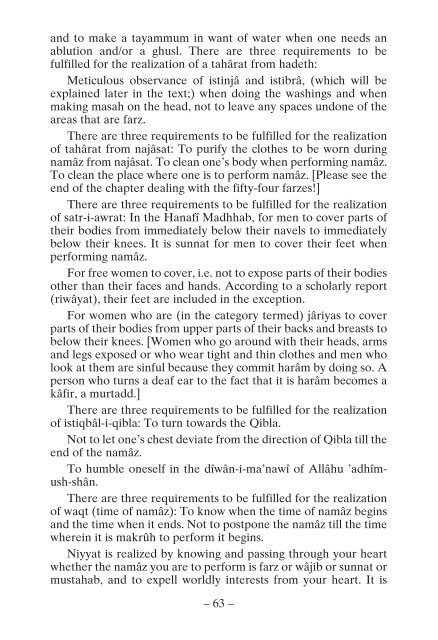Miftah-ul-Janna (Booklet for way to Paradise)
Create successful ePaper yourself
Turn your PDF publications into a flip-book with our unique Google optimized e-Paper software.
and <strong>to</strong> make a tayammum in want of water when one needs an<br />
ablution and/or a ghusl. There are three requirements <strong>to</strong> be<br />
f<strong>ul</strong>filled <strong>for</strong> the realization of a tahârat from hadeth:<br />
Metic<strong>ul</strong>ous observance of istinjâ and istibrâ, (which will be<br />
explained later in the text;) when doing the washings and when<br />
making masah on the head, not <strong>to</strong> leave any spaces undone of the<br />
areas that are farz.<br />
There are three requirements <strong>to</strong> be f<strong>ul</strong>filled <strong>for</strong> the realization<br />
of tahârat from najâsat: To purify the clothes <strong>to</strong> be worn during<br />
namâz from najâsat. To clean one’s body when per<strong>for</strong>ming namâz.<br />
To clean the place where one is <strong>to</strong> per<strong>for</strong>m namâz. [Please see the<br />
end of the chapter dealing with the fifty-four farzes!]<br />
There are three requirements <strong>to</strong> be f<strong>ul</strong>filled <strong>for</strong> the realization<br />
of satr-i-awrat: In the Hanafî Madhhab, <strong>for</strong> men <strong>to</strong> cover parts of<br />
their bodies from immediately below their navels <strong>to</strong> immediately<br />
below their knees. It is sunnat <strong>for</strong> men <strong>to</strong> cover their feet when<br />
per<strong>for</strong>ming namâz.<br />
For free women <strong>to</strong> cover, i.e. not <strong>to</strong> expose parts of their bodies<br />
other than their faces and hands. According <strong>to</strong> a scholarly report<br />
(riwâyat), their feet are included in the exception.<br />
For women who are (in the category termed) jâriyas <strong>to</strong> cover<br />
parts of their bodies from upper parts of their backs and breasts <strong>to</strong><br />
below their knees. [Women who go around with their heads, arms<br />
and legs exposed or who wear tight and thin clothes and men who<br />
look at them are sinf<strong>ul</strong> because they commit harâm by doing so. A<br />
person who turns a deaf ear <strong>to</strong> the fact that it is harâm becomes a<br />
kâfir, a murtadd.]<br />
There are three requirements <strong>to</strong> be f<strong>ul</strong>filled <strong>for</strong> the realization<br />
of istiqbâl-i-qibla: To turn <strong>to</strong>wards the Qibla.<br />
Not <strong>to</strong> let one’s chest deviate from the direction of Qibla till the<br />
end of the namâz.<br />
To humble oneself in the dîwân-i-ma’nawî of Allâhu ’adhîmush-shân.<br />
There are three requirements <strong>to</strong> be f<strong>ul</strong>filled <strong>for</strong> the realization<br />
of waqt (time of namâz): To know when the time of namâz begins<br />
and the time when it ends. Not <strong>to</strong> postpone the namâz till the time<br />
wherein it is makrûh <strong>to</strong> per<strong>for</strong>m it begins.<br />
Niyyat is realized by knowing and passing through your heart<br />
whether the namâz you are <strong>to</strong> per<strong>for</strong>m is farz or wâjib or sunnat or<br />
mustahab, and <strong>to</strong> expell worldly interests from your heart. It is<br />
– 63 –

















